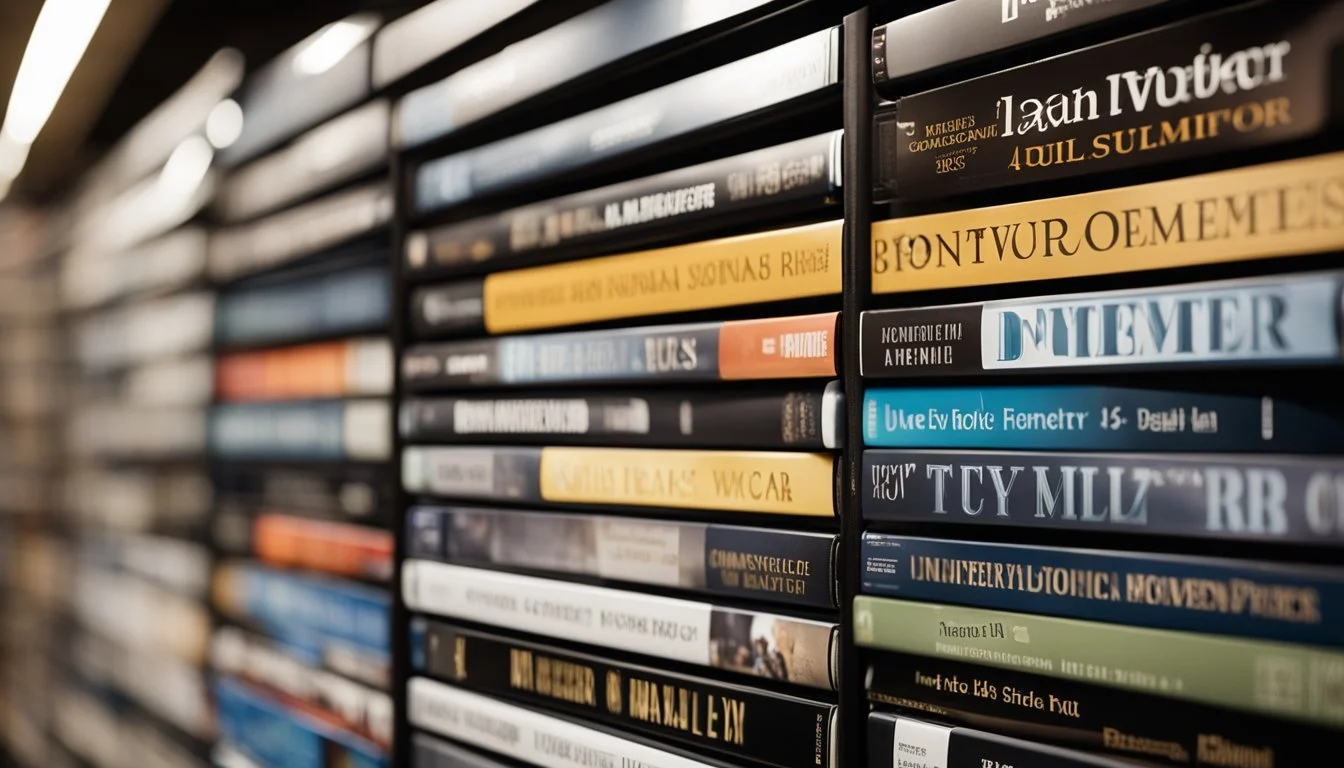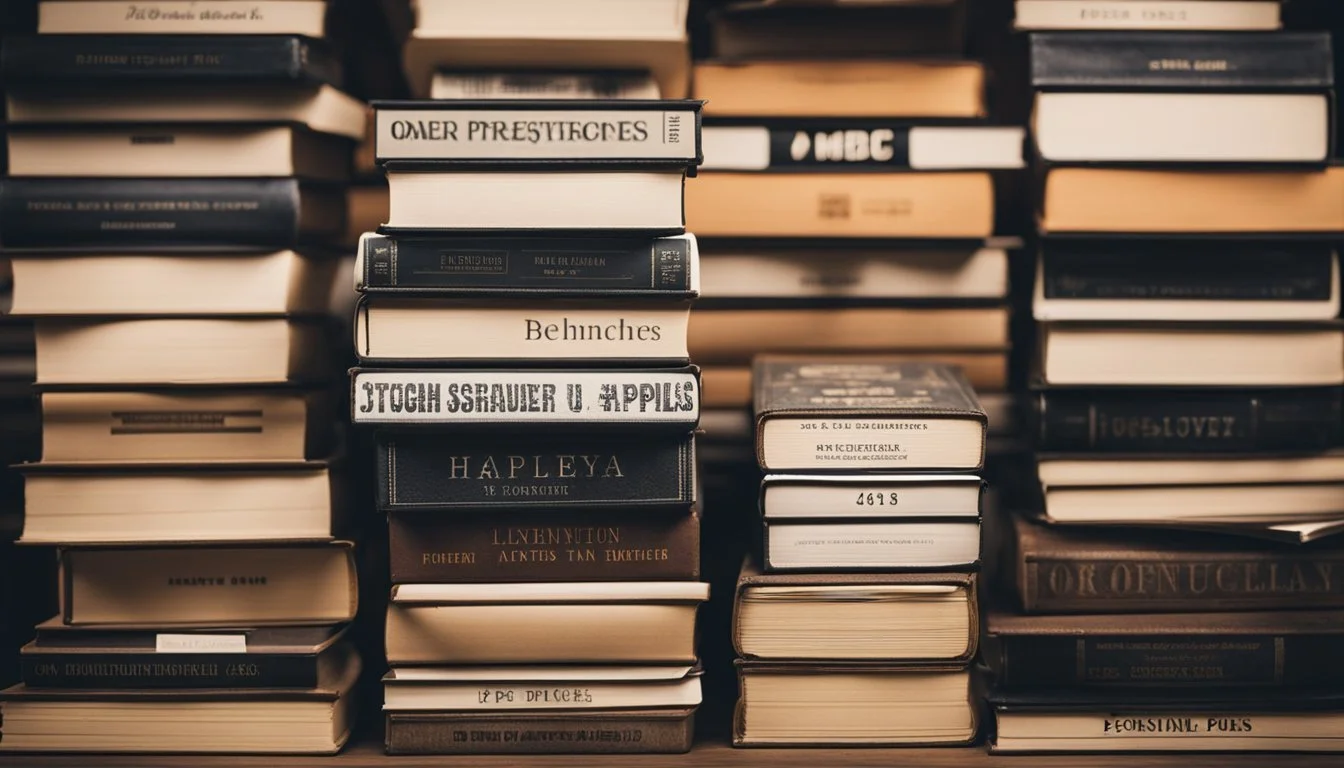10 Documentaries on the Lives of Contemporary Writers
Exploring Modern Literary Genius
Documentaries offer a compelling window into the lives of contemporary writers, providing viewers with an intimate look at their creative processes, personal experiences, and the broader contexts in which they work. These films not only highlight the challenges and triumphs faced by these authors but also illuminate the societal and cultural issues they address through their writing.
For those interested in gaining a deeper appreciation of literary figures and their contributions to modern literature, these documentaries are invaluable resources. By watching these films, audiences can better understand the motivations, hardships, and inspirations that shape the works of some of the most influential writers of our time.
1) Toni Morrison: The Pieces I Am (2019)
Toni Morrison: The Pieces I Am is a documentary directed by Timothy Greenfield-Sanders. This film delves into the life and career of Toni Morrison, an esteemed American novelist and Nobel Prize winner.
The documentary explores significant works such as Beloved, Sula, and Song of Solomon, highlighting their impact in the literary world. Toni Morrison discusses her inspirations, craft, and the challenges she faced throughout her career.
The film features interviews with notable figures like Oprah Winfrey, Angela Davis, and Hilton Als. These insights provide a deeper understanding of Morrison's influence on contemporary literature.
To learn more about the film, visit IMDb.
2) Joan Didion: The Center Will Not Hold (2017)
"Joan Didion: The Center Will Not Hold" is a documentary film directed by Griffin Dunne, Didion's nephew. It offers an intimate look into the life of Joan Didion, one of the most influential American writers of the 20th century.
The documentary explores Didion's remarkable career and the personal tragedies she faced. It includes interviews with Didion herself and people who knew her well.
Her writing, known for its incisive style and keen observations, is highlighted throughout the film, making it a must-watch for both fans and newcomers.
Released on Netflix, the documentary features contributions from prominent figures such as Anna Wintour. The film is 94 minutes long and provides a comprehensive view of Didion's life and legacy.
For more information, visit the IMDb page.
3) James Baldwin: The Price of the Ticket (1990)
This documentary focuses on the life, works, and influence of James Baldwin, a towering figure in American literature and civil rights activism.
The film includes rare and archival footage, showcasing Baldwin's thoughts on race, identity, and social justice. It provides a provocative and honest look into his experiences as a Black, gay writer in mid-20th century America.
The documentary features interviews with Baldwin's friends, family, and colleagues, enriching the narrative with personal anecdotes and reflections.
Directed by Karen Thorsen and premiering at the Sundance Film Festival in 1990, the film has been broadcast in over 40 countries and screened at more than 50 film festivals worldwide.
For more information, visit the IMDB page.
4) Margaret Atwood: A Word After a Word After a Word Is Power (2019)
"Margaret Atwood: A Word After a Word After a Word Is Power" is a documentary that delves into the life and career of the renowned Canadian author and poet, Margaret Atwood.
Directed by Nancy Lang and Peter Raymont, this film takes viewers through Atwood's early days in the Canadian wilderness to her rise as a literary icon.
The documentary features personal stories and insights from Atwood herself, as well as from friends and family. It closely examines her notable works, including "The Handmaid's Tale" and its sequel, "The Testaments."
Atwood's work remains impactful and relevant, reflecting modern societal and political shifts. The film captures her thoughts and processes, offering a comprehensive look at her influence and literary journey.
5) David Foster Wallace: The End of the Tour (2015)
The End of the Tour offers a captivating look into the life of David Foster Wallace through his interactions with journalist David Lipsky. Directed by James Ponsoldt, the film is based on Lipsky's memoir, Although of Course You End Up Becoming Yourself.
Jason Segel stars as Wallace, portraying the famed novelist with notable depth and sensitivity. The narrative centers around a five-day interview conducted by Lipsky, played by Jesse Eisenberg.
The film delves into personal and professional aspects of Wallace's life, touching on themes of fame, creative pressure, and mental health. Their conversations provide intimate insights into Wallace's thoughts and character.
For those interested in contemporary literature, The End of the Tour is an invaluable visual resource. It brings to life the complexities of one of the most influential writers of his generation. More information on IMDb.
6) Zadie Smith: Speaking in Tongues
"Speaking in Tongues" by Zadie Smith is more than just an essay; it is a meditation on voice, identity, and the layers that construct a person. Smith, born in North London in 1975, explores her own transition from childhood to adulthood, marked by an evolving way of speaking.
This reflective piece dares readers to consider how different experiences shape their identities. Smith's journey through education reveals how her voice shifted from that of her youthful days to a more cultivated English accent. This change signifies broader socio-cultural themes beyond her individual experience.
Smith's works, including her first novel "White Teeth," and subsequent books, have established her as both a novelist and a public intellectual. Her essay "Speaking in Tongues" stands out for its insightful commentary on language and self-presentation, mirroring the complex interplay of personal and public spheres.
For more on Zadie Smith: Zadie Smith on Wikipedia (2009)
7) Salman Rushdie: Death on a Trail (2019)
"Salman Rushdie: Death on a Trail" is a revealing documentary directed by William Karel.
The film explores the tumultuous period following the publication of Rushdie's novel, "The Satanic Verses," in 1988. This controversial book led to a fatwa being issued against Rushdie by Ayatollah Khomeini. The documentary provides detailed insights into the subsequent decades of living under constant threat.
Salman Rushdie is depicted candidly, showcasing both his resilience and the impact this period had on his personal and professional life. Viewers can expect interviews with key figures connected to Rushdie and insightful commentary on the broader cultural and political effects of the fatwa.
The documentary stands out for its comprehensive look at how the threat of death shaped Rushdie's writing and outlook on life. It also touches on lesser-known aspects of his experiences, making it a captivating watch for those interested in contemporary literary figures and the intersections of politics and literature.
For more information, visit IMDb.
8) Elena Ferrante: The Ferrante Phenomenon
Elena Ferrante, the pseudonymous author behind the acclaimed "Neapolitan Novels," has fascinated readers worldwide. Her anonymity and compelling storytelling have sparked widespread intrigue.
The documentary "Ferrante Fever" (2017) directed by Giacomo Durzi, explores the global impact of Ferrante's work. The film highlights her significant influence on contemporary literature, especially among women writers.
The unique approach of "Ferrante Fever" refrains from exposing Ferrante's identity. Instead, it focuses on celebrating her narrative craft and passionate fanbase. Through interviews and analyses, the documentary paints a vivid picture of Ferrante's literary world.
For more information, visit the IMDB page for Ferrante Fever.
9) Chimamanda Ngozi Adichie: The Art of Fiction
Chimamanda Ngozi Adichie is renowned for her exploration of cultural identity, race, and diaspora in her work. She has penned acclaimed novels such as "Americanah," "Half of a Yellow Sun," and "Purple Hibiscus." Her stories often highlight the complexities of navigating different cultural landscapes.
The documentary "Chimamanda Ngozi Adichie: The Art of Fiction" (2017) delves into her creative process and the inspiration behind her distinctive narrative style. It offers an intimate look at how personal and historical experiences influence her writing. The film also features interviews with Adichie, providing insights into her thoughts on literature and society.
For more information, visit IMDB.
10) J.K. Rowling: A Year in the Life (2007)
This documentary, directed by James Runcie, offers a rare glimpse into a year in the life of J.K. Rowling. Filmed from October 2006 to October 2007, the film chronicles the final stages of writing and the publication of "Harry Potter and the Deathly Hallows."
The audience gets to see Rowling in various settings, from her home life to public appearances.
The documentary provides personal and professional insights into Rowling's world. It covers her creative process, including moments of inspiration and challenges. Additionally, viewers gain an understanding of the pressures and expectations she faced as she concluded her famous series.
"J.K. Rowling: A Year in the Life" highlights the author's journey not just as a writer but as a person navigating immense success and its accompanying pressures.
For more information, you can visit the IMDb page.
Cinematic Techniques in Documentaries
Cinematic techniques in documentaries play a crucial role in engaging viewers and conveying authenticity. These methods enhance the storytelling experience, making the films more immersive and emotionally resonant.
Interview Formats
A variety of interview formats are used to bring depth and perspective to documentaries. Talking-head interviews, where subjects speak directly to the camera, provide clear and focused insights. This format allows viewers to connect personally with the interviewee, making their stories more impactful.
B-roll footage complements these interviews, showing the subject in their environment and adding visual context. Reenactments or dramatizations offer a more narrative-driven approach, helping to illustrate events that cannot be filmed directly.
Additionally, walk-and-talk interviews capture candid, conversational moments, offering a dynamic view of the subject's personality. These techniques ensure a multifaceted and engaging portrayal of individuals' lives.
Narrative Structure
A well-crafted narrative structure is essential for maintaining the audience's interest throughout a documentary. Linear narratives, which follow events chronologically, provide a straightforward, easy-to-follow storyline. This format is particularly effective for biographical documentaries, as it traces the subject's life from beginning to present.
In contrast, non-linear narratives allow filmmakers to jump between different time periods, offering a more complex and layered understanding of the subject. Flashbacks and flash-forwards can highlight significant events and their impact on the present.
Story arcs, such as the hero's journey, can be applied to underscore personal growth or transformation. By carefully choosing the narrative structure, filmmakers can enhance the emotional depth and engagement of their documentary, making the life story of their subject compelling and relatable.
Themes and Topics Explored
These documentaries go deep into writers' personal battles and the broader influence they have had on society and culture.
Personal Struggles
Many of these films highlight the personal hardships faced by writers. For instance, Joan Didion: The Center Will Not Hold and the documentary on Kurt Vonnegut both provide intimate glimpses into the mental and emotional strains these authors endured. Didion's journey through joys and tragedies, marked by precise prose and intense analyses, reveals her vulnerability.
Vonnegut's life, marked by satire and dark humor, was deeply informed by his challenges. Through interviews with family and friends, his complicated personality emerges. These struggles not only shaped their writing but also offered fans a profound understanding of the cost of literary brilliance.
Cultural Impact
The documentaries also delve into the significant social and cultural impacts these writers have made. Toni Morrison: The Pieces I Am showcases Morrison's influence on American literature and culture, highlighting her powerful works that address deep-seated racial issues.
The film on Vonnegut emphasizes his social commentary that resonated with many readers. Similarly, Bartleby en coulisses introduces viewers to overlooked authors whose contributions are vital to the literary landscape. Each documentary underscores the broader context in which these writers’ works have contributed to cultural dialogues and societal change.
The Role of Contemporary Writers
Contemporary writers play a crucial role in shaping modern literature and providing insightful social and political commentary, reflecting and influencing the world.
Contributions to Modern Literature
Contemporary writers have revolutionized modern literature by experimenting with narrative styles, genres, and themes. They often blur the lines between fiction and non-fiction, creating innovative storytelling techniques.
One notable example is Joan Didion, known for her precise prose and piercing analysis of contemporary life.
Additionally, they explore diverse perspectives, giving voice to previously marginalized communities. They challenge readers to consider new viewpoints and foster empathy. Writers like Kurt Vonnegut are renowned for blending satire and dark humor to address complex issues.
This not only enriches readers' understanding but also pushes the boundaries of what literature can achieve.
Social and Political Commentary
Many contemporary writers engage directly with current social and political issues, using their platforms to advocate for change.
For instance, Annette Mbaye d'Erneville was not just a writer but also an activist for gender equality in Senegal.
These writers often critique power structures, address injustices, and highlight the struggles of everyday people. Their works serve as a mirror to society, revealing harsh truths and sparking necessary conversations.
By doing so, they encourage readers to question the status quo and consider their roles in effecting social change. Through their poignant and powerful narratives, contemporary writers contribute significantly to the ongoing discourse on social justice and political reform.






